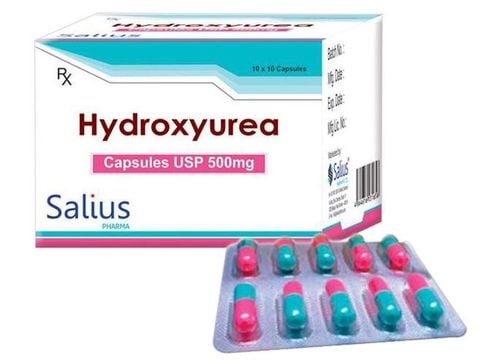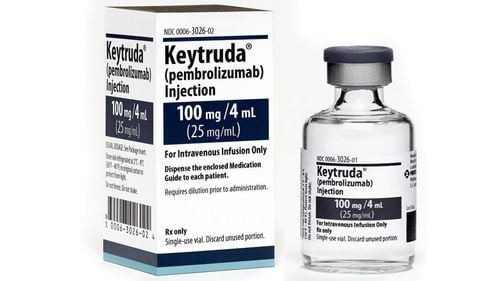This is an automatically translated article.
Busulfan drug participates in alkylation, has use in the anti-cancer process. The drug is prepared in the form of tablets and injections,... You should only use Busulfan when prescribed by your doctor because it is a prescription drug.
1. What is Busulfan?
The use of Busulfan drug is to fight the growth of cancer. Alkylation has the potential to damage a cell's DNA, preventing them from dividing and unable to grow. Because cancer cells in general divide more quickly and repair less errors than healthy cells, they are more susceptible to this damage.
2. Instructions for using Busulfan
Busulfan is prepared in the form of tablets, taken orally. In addition, it is also available in intravenous form and is administered to patients by medical staff.
Dosage may vary from person to person. Because the dose of the drug depends on the body's stimulation, the user's medical condition. Busulfan may be used alone or in combination with several other medications.
3. Instructions for storing Busulfan drugs and how to store them
Store your medicine in its original, labeled packaging at room temperature and in a dry place. Dispose of expired drugs according to the manufacturer's regulations, do not arbitrarily release into the environment.
4. Side effects during the use of Busulfan
Side effects may appear differently in each patient. They can be controlled with treatment with medication or some other supportive measures.
Some common side effects:
Low white blood cell count : During treatment, your white blood cell count may drop putting you at higher risk of infection. You should tell your doctor or nurse right away if you have a fever, sore throat or cold, trouble breathing, cough, burning when you urinate, pain that does not heal. Anemia (low red blood cell count): Red blood cells are responsible for transporting oxygen to tissues and organs in the body. When the red blood cell count (RBC) is low, the person will experience symptoms such as fatigue or weakness. You should see your doctor if you feel short of breath or have chest pain. When the count is too low, you may receive a blood transfusion. Thrombocytopenia: When the number of platelets in the body is lower than prescribed, the patient will have a high risk of bleeding. This is because platelets play an important role in blood clotting. Clinical manifestations may include bruising or excessive bleeding. Nausea and vomiting: Your doctor may prescribe some medications to control nausea and vomiting. Avoid things that can worsen symptoms, such as heavy or greasy and fatty foods, spices, acidic foods (lemons, tomatoes, oranges). Mouth ulcers (mucositis): Using medicines to treat cancer can cause sores or sores in your mouth and throat. If your mouth, tongue, inside of your cheeks or throat becomes white, sore, or painful, tell your doctor right away. If you feel too much pain and discomfort, you may be able to suggest pain relievers. Change in appetite, difficulty eating: Cancer treatment can affect your appetite, and in some cases, treatment side effects can make it difficult to eat. Diarrhea: Your doctor may ask you to combine Busulfan with anti-diarrheal medications. Also, try eating low-fiber, low-spice foods (white rice and boiled or grilled chicken). Raw vegetables, wholegrain breads, cereals and seeds can make your diarrhea worse. Drink 8-10 glasses of water/day to prevent dehydration. Electrolyte abnormalities: This medicine may affect the normal levels of electrolytes (potassium, magnesium, ...) in your body. Levels of substances will be monitored with a blood test. If your levels become too low, your doctor may prescribe electrolytes to. Do not take any supplements without consulting your doctor. High blood sugar: Busulfan may increase blood sugar in patients with or without diabetes. If you experience increased thirst, urination or hunger, blurred vision, headache, or fruity breath, notify your doctor immediately. Diabetics need to monitor blood sugar levels on a regular basis. Rash: Some patients may experience a rash, scaly skin, or an itchy red rash after using Busulfan. To reduce this symptom you should use an alcohol-free moisturizer on your skin and lips, avoid moisturizers with perfumes or fragrances, and use some extra medicine if you feel too itchy and uncomfortable. Presence of blood clots, heart attack or stroke patients: Busulfan may increase the risk of blood clots, stroke, and heart attack. Dry mouth: Busulfan can cause dry mouth that makes you feel uncomfortable and affects your ability to speak, swallow, and oral health. You should perform regular oral hygiene with fluoride toothpaste, floss once a day, rinse regularly to keep the mouth moist. Allergic Reactions: Signs that a patient has had an allergic reaction to Busulfan include shortness of breath or difficulty breathing, chest pain, rash, flushing, itching, and decreased blood pressure. In addition, Busulfan may cause some other side effects such as fever, insomnia, body aches, constipation, fatigue, headache, .. Less common side effects include: Seizures: Co Convulsions may occur with high doses of Busulfan. Lung changes: This drug can cause pulmonary fibrosis (scarring and hardening of lung tissue). This can happen months to years after starting the medication. Symptoms include cough, shortness of breath, or low-grade fever. Secondary malignancies: There is little risk of developing leukemia or another type of cancer from treatment with this drug, which can occur many years after treatment. This condition is common in patients receiving high doses of Busulfan for a long time or repeatedly. Venous thromboembolism: In rare cases, Busulfan can cause venous thromboembolism. Venous thromboembolism is a condition in which the small veins in the liver become blocked.
5. How does Busulfan affect fertility?
This medicine can affect your reproductive organs, make your menstrual cycle or sperm production irregular, or even stop it permanently. Women may experience signs of menopause (hot flashes, vaginal dryness, decreased sex drive).
Exposure of the fetus to this drug can cause birth defects, so you should not intend to have a baby while taking this medicine. People who are breastfeeding should not use the drug. A consideration should be given between breastfeeding and treatment with Busulfan.
Busulfan drug is effective in fighting cancer. However, the drug can cause many side effects for users. That's why it's so important to follow your doctor's instructions.
Please dial HOTLINE for more information or register for an appointment HERE. Download MyVinmec app to make appointments faster and to manage your bookings easily.
Reference source: oncolink.org













